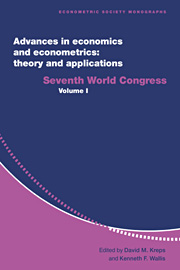Book contents
- Frontmatter
- 1 Trade and wages
- 2 Politics and trade policy
- 3 Economic analysis of political institutions: an introduction
- 4 Game-theoretic models of market structure
- 5 Rationality and knowledge in game theory
- 6 Experiments and the economics of individual decision making under risk and uncertainty
- 7 Theory and experiment in the analysis of strategic interaction
- 8 Evolutionary game theory in economics
- 9 Learning from learning in economics
- Index
5 - Rationality and knowledge in game theory
Published online by Cambridge University Press: 05 January 2013
- Frontmatter
- 1 Trade and wages
- 2 Politics and trade policy
- 3 Economic analysis of political institutions: an introduction
- 4 Game-theoretic models of market structure
- 5 Rationality and knowledge in game theory
- 6 Experiments and the economics of individual decision making under risk and uncertainty
- 7 Theory and experiment in the analysis of strategic interaction
- 8 Evolutionary game theory in economics
- 9 Learning from learning in economics
- Index
Summary
INTRODUCTION
The concepts of knowledge and rationality have been explicitly applied by economists and game theorists to obtain no-trade results and to characterize solution concepts of games. Implicitly these two concepts underlie much recent work in these fields, ranging from information economics through refinements to attempts to model bounded rationality. Our discussion of the game theoretic and economic literatures on knowledge and rationality will focus on these foundational issues and on the characterizations of solution concepts. Our discussion builds on Harsanyi's (1967) foundation for games of incomplete information and Aumann's (1976) model of common knowledge, on the one hand, and, on the other hand, Bernheim's (1984) and Pearce's (1984) characterization result that, if rationality is common knowledge, then in normal-form games players will choose strategies that survive iterated deletion of strongly dominated strategies.
We begin in section 2 by responding to recent explicit and implicit criticisms of this research agenda. These criticisms are based on the idea that various paradoxes demonstrate that common knowledge of rationality is a problematic notion. We argue instead that these paradoxes are the result of confusing the conclusions that arise from (equilibrium) analysis with assumptions about behavior. A simple example concerns the paradox of cooperation in the Prisoners' Dilemma. Clearly the outcome of the PD will be symmetric. Thus, some have argued, the non-cooperative outcome cannot be the consequence of common knowledge of rationality since, by symmetry, if a player chooses to cooperate so will her opponent.
Information
- Type
- Chapter
- Information
- Advances in Economics and Econometrics: Theory and ApplicationsSeventh World Congress, pp. 87 - 172Publisher: Cambridge University PressPrint publication year: 1997
Accessibility standard: Unknown
Why this information is here
This section outlines the accessibility features of this content - including support for screen readers, full keyboard navigation and high-contrast display options. This may not be relevant for you.Accessibility Information
- 20
- Cited by
